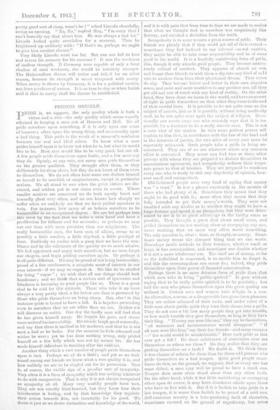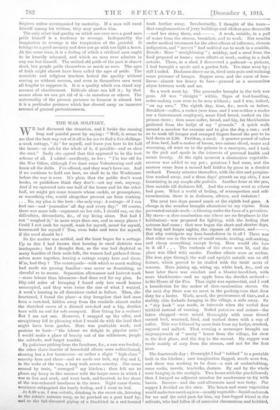PRIDING ONESELF.
1)RIDE is, we suppose, the only quality which is both a
virtue and a vice—the only quality which seems equally effectual in keeping a man out of Heaven and Hell. We all pride ourselves upon something, if it is only upon our sense of humour ; often upon the wrong thing, and occasionally upon a bad thing. This pride is the result of a moment's confusion between our real and ideal selves. To know what a man prides himself upon is to know not what he is, but what he would like to be. Most men would like to be very good, but not all. A few people pride themselves upon faults, and a few more say they do. Openly, at any rate, not many men pride themselves on the greater qualities. They struggle after them, or they deliberately let them alone, but they do not boast of them even to themselves. We do not often hear some one declare himself or herself to be unselfish or magnanimous, except in particular actions. We all stand in awe when the great virtues are dis- cussed, and seldom put in our claim even in secret. Where smaller matters are concerned we do both openly boast and inwardly gloat very often, •and no one knows how sharply we suffer when we suddenly sea that we have prided ourselves in vain. For instance, how many of us believe ourselves to be businesslike in an exceptional degree. We are led perhaps into this error by the feet that we write a neat hand and have a predilection for tidiness and for accounts ; or perhaps wo map out our time with more precision than our neighbours. The really businesslike man, the born man of affairs, seems to us possibly a little careless, a little slipshod, a little prodigal of time. Suddenly wo realize with a pang that we have the sem- blance and he the substance of the quality we so much admire. We feel aggrieved and angry with ourselves, but we soon forget our chagrin, and begin priding ourselves again. Or perhaps it is all quite different. We may be proud of not being businesslike, proud of a fine carelessness, a complete want of interest in our own interest—if wo may so express it. We like to be chaffed for being " vague " ; we wish that all our doings should look handsome ; and we think that a certain sort of igncranco and blindness is becoming to good people like us. There is a great deal to be said for this attitude. Those who take it up have always a very pretty ideal, a far better ono than is possessed by those who pride themselves on being sharp. But, alas in this instance pride is bound to have a fall. It is hopeless pretending even to ourselves that we are sillier than we are. Mother-wit will discover an outlet. One day the lordly man will find that he has given himself away. He forgets his pose, and shows some natural business ability. His friends laugh good-naturedly, and say that there is method in his madness, and that he is not such a fool as he looks. For the moment he feels ashamed and wishes he were ; yet he has done nothing wrong, only prided himself on a fine folly which was not by nature his. lie has made himself ridiculous in reaching after the sublime.
Another thing which a vast number of people pride themselves upon is tact. Perhaps we all do a little ; and yet as we look round among our friends we know what a rare quality it is, and how unlikely we are to be singled out for its possession. Tact is, of course, the visible sign of a peculiar sort of sympathy. Very often it is a form of sympathy which has nothing whatever to do with compassion. That is why it is not always recognized as sympathy at all. Many very worldly people have tact. They are not exactly kind-hearted, but they know how their interlocutor is feeling, and by that knowledge they regulate their action towards him, not invariably for his good. We desire it just as we desire distinction and knowledge of the world, and it is with pain that from time to time we are made to realize that what wo thought tact in ourselves was suspiciously like flattery, and entailed a deviation from the truth.
Scrupulosity is to some women a great source of pride. Their friends see plainly that if they could get rid of their eternal— sometimes they feel inclined to say infernal—moral caution, they might be able to take some responsibility and be of some good in the world. It is a fearfully embittering form of pride, this, though it only attacks good people. They become meticu- lously critical of conduct. They approve of almost no one, and tempt their friends to wish them a slip into any kind of m:11 vice to awaken them from their pharisaical dream. They never do slip. They become better and better in their own negative sense, and more and more worthless in any positive ono, till they get old and out of touch with any kind of reality. On the other hand, they have done no harm in the world, and have some sort of right to pride themselves on that when they come to the end of their careful lives. It is possible to be not quite sane on the subject of morals, just as it is passible, without being medically mad, to be not quite sane upon the subject of religion. Ocea- sionally one meets some one who seriously says that it is im- possible for a barrister to be a really sincere men. This is not a sane view of the matter. In vain some patient person will explain to him that, in accordance with the law of the land and in the interests of justice, the two sides of every case must bo separately rehearsed. Such people take a pride in being un- convinced. They are of no use whatever where any common effort Is concerned. They never can find two or three other persons with whoM they are prepared to declare themselves in conscientious agreement, and scrupulosity reduces their corpo- rate power to that of lukatios. They are prepared to condemn every one who is ready to sink any singularity of opinion, how ever small and unimportant.
Old-fashioned people were very fond of saying that money was " a trust." It was a phrase constantly in the mouths of those who had plenty of it. Sometimes they meant that they ought to do good with it ; more often they meant that they fully intended to get their money's-worth. They wore not troubled with any doubts as to whether they ought to have a large fortune and spend it on themselves, but they wore deter- mined to use it to as great advantage in the thrifty sense as possible. They thought a great deal about small sums, and prided themselves on not wasting silver or overpaying any one, never realizing that we must very often waste something. The only question is, what : time, or thought, or money. Some- times money seems the cheapest thing that we can waste. Nowadays men's attitude to their fortunes, whether small or large, is less conscientious, and -sometimes one doubts whether it is not a more wholesome one. The chief use of money, so far as the individual is concerned, is to enable him to forget it, and this the overscrupulous can never do ; indeed, thoy pride themselves upon their power of financial concentration.
Perhaps there is no more delusive form of pride than that which men take in being " public-spirited." It goes without saying that to be really public-spirited is to be patriotic ; but half the men who plume themselves upon this groat quality are without it. Certain men and women take delight in a row. An altercation, a scene, or a disagreeable fuss gives them pleasure. They are rather ashamed of their taste, and under cover of a little cant about public spirit they turn their shame into a pride. They do not care a bit how many people they get into trouble, or how much trouble they give themselves, so long as they have their fling. " H every one were like me," they say to themselves, " all nuisances and inconveniences would disappear." " If all men were like him," say their few friends—and many enemies —" the world would be uninhabitable." Does such pride as this over get a fall 1 Do these cultivators of contention ever see themselves as others see them ? Do they realize that they are priding themselves on a fault ? We doubt it. We think there is less chance of reform for them than for those odd persons who pride themselves on a bad temper. Quite good people some- times do this, on the ground, wo suppose, that as every one has some defect, a man may well be proud to have a small ono. Temper does more often stand alone than any other fault. On the other hand, while it has little embittering or corruptiug, effect upon its owner, it may have disastrous effects upon those who have to live with it. But if it is foolish to take pride in a hot temper, it is worse than foolish to be proud of a cold one. Self-conscious severity is a hate-producing fault of character, sometimes excused on the ground of expediency, but never
forgiven unless accompanied by austerity. if a man will enrol himself among his victims, they may pardon him.
The only other bad quality on which one ever sees a good man pride himself is a tendency to revenge. Indisputably the temptation to revenge is the temptation of the grateful. It belongs to a good memory and does not go with too light a heart. At the same time, it is a feeling of which a civilized man ought to be heartily ashamed, and which no man ever admires in any one but himself. The wicked old pride of the past is almost dead, but people pride themselves as much as ever. The ages of faith might almost have been called the ages of pride. The moralists and religious teachers lashed the quality without ceasing as without success, and even in themselves men went all lengths to suppress it. It is a quality which can stand any amount of chastisement. Ridicule alone can kill it ; by that means alone we can get rid of it—in ourselves or others: The universality of the present pretence to humour is absurd, but it is a particular pretence which has cleared away an immense amount of general pretentiousness.





















































 Previous page
Previous page